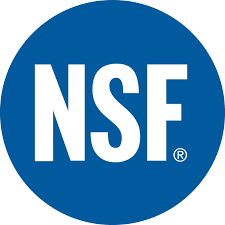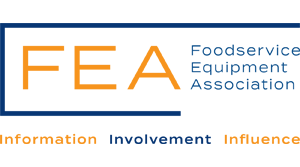NSF Sanitation Certification for North America explained
NSF International
NSF International is an independent, accredited organization which develops standards and offers certification and verification programs for commercial foodservice equipment, specified by health departments, restaurant buyers and specifiers. Commercial food equipment with the NSF mark receives guaranteed regulatory acceptance in North America and improved acceptance worldwide.
NSF International is an independent, accredited organization which develops standards and offers certification and verification programs for commercial foodservice equipment, specified by health departments, restaurant buyers and specifiers. Commercial food equipment with the NSF mark receives guaranteed regulatory acceptance in North America and improved acceptance worldwide.
The role of the FDA Food Code
European manufacturers offering their Food Equipment on the North American market are not always aware of the background and value of the NSF certification. To understand the value of the program, it is important to understand the role of the Food Code of the U.S. Food and Drug Administration (FDA).
The FDA Food Code is adopted by all the states and contains the legal requirements for food service establishments. It covers all aspects related to food safety and one of these aspects is the food equipment that is used to prepare, store and display food.
NSF sanitation standards
The NSF sanitation standards for commercial food equipment have been developed to cover these FDA requirements with regard to three hygienic aspects:
- The suitability of the materials in direct contact with food
- The design and the construction of the equipment, in particular with regard to its cleanability
- The performance of the equipment when it comes to health risks (e.g. temperature performance)
- The suitability of the materials in direct contact with food
- The design and the construction of the equipment, in particular with regard to its cleanability
- The performance of the equipment when it comes to health risks (e.g. temperature performance)
US Public health agencies
Public health agencies, responsible for the regulation of the foodservice industries, check if the requirements in the FDA Food Code are met. They regularly send out food inspectors to food service establishments who, if they find any non-compliances, could force the establishment to close down.
This means that the certification to the NSF Food Equipment standards is demanded by virtually all food service establishments in the US, as well as in Canada, where similar legislation is in place.
Products that are found to comply with the appropriate NSF standard will receive an NSF mark. For the food inspectors carrying out their inspection, this demonstrates that these products meet and exceed the FDA Food Code requirements.
Is NSF certification necessary?
NSF sanitation certification is voluntary and informs the food inspector that the food equipment meets FDA requirements. Exporters to the United States will find that their potential customers or the distributors they want to work with, will first of all ask whether the equipment they offer is NSF certified. This is a result of the fact that they know that food inspectors rely on the NSF certification mark when visiting food service establishments such as quick service restaurants and retail outlets.
This is a summary of the article “NSF Sanitation Certification for North America Explained”. To receive the full article, just send an e-mail to europe@nsf.org.
NSF International
NSF International is an independent, accredited organization which develops standards and offers certification and verification programs for commercial foodservice equipment, specified by health departments, restaurant buyers and specifiers. Commercial food equipment with the NSF mark receives guaranteed regulatory acceptance in North America and improved acceptance worldwide.
NSF International is an independent, accredited organization which develops standards and offers certification and verification programs for commercial foodservice equipment, specified by health departments, restaurant buyers and specifiers. Commercial food equipment with the NSF mark receives guaranteed regulatory acceptance in North America and improved acceptance worldwide.
The role of the FDA Food Code
European manufacturers offering their Food Equipment on the North American market are not always aware of the background and value of the NSF certification. To understand the value of the program, it is important to understand the role of the Food Code of the U.S. Food and Drug Administration (FDA).
The FDA Food Code is adopted by all the states and contains the legal requirements for food service establishments. It covers all aspects related to food safety and one of these aspects is the food equipment that is used to prepare, store and display food.
NSF sanitation standards
The NSF sanitation standards for commercial food equipment have been developed to cover these FDA requirements with regard to three hygienic aspects:
- The suitability of the materials in direct contact with food
- The design and the construction of the equipment, in particular with regard to its cleanability
- The performance of the equipment when it comes to health risks (e.g. temperature performance)
- The suitability of the materials in direct contact with food
- The design and the construction of the equipment, in particular with regard to its cleanability
- The performance of the equipment when it comes to health risks (e.g. temperature performance)
US Public health agencies
Public health agencies, responsible for the regulation of the foodservice industries, check if the requirements in the FDA Food Code are met. They regularly send out food inspectors to food service establishments who, if they find any non-compliances, could force the establishment to close down.
This means that the certification to the NSF Food Equipment standards is demanded by virtually all food service establishments in the US, as well as in Canada, where similar legislation is in place.
Products that are found to comply with the appropriate NSF standard will receive an NSF mark. For the food inspectors carrying out their inspection, this demonstrates that these products meet and exceed the FDA Food Code requirements.
Is NSF certification necessary?
NSF sanitation certification is voluntary and informs the food inspector that the food equipment meets FDA requirements. Exporters to the United States will find that their potential customers or the distributors they want to work with, will first of all ask whether the equipment they offer is NSF certified. This is a result of the fact that they know that food inspectors rely on the NSF certification mark when visiting food service establishments such as quick service restaurants and retail outlets.
This is a summary of the article “NSF Sanitation Certification for North America Explained”. To receive the full article, just send an e-mail to europe@nsf.org.
NSF EUROPE
Ikaroslaan 79, 1930 Zaventem, Brussels, Belgium
t: +32 27 713 654 | e: europe@nsf.org | w: www.nsf.org
NSF International
NSF International is an independent, accredited organization which develops standards and offers certification and verification programs for commercial foodservice equipment, specified by health departments, restaurant buyers and specifiers. Commercial food equipment with the NSF mark receives guaranteed regulatory acceptance in North America and improved acceptance worldwide.
NSF International is an independent, accredited organization which develops standards and offers certification and verification programs for commercial foodservice equipment, specified by health departments, restaurant buyers and specifiers. Commercial food equipment with the NSF mark receives guaranteed regulatory acceptance in North America and improved acceptance worldwide.
The role of the FDA Food Code
European manufacturers offering their Food Equipment on the North American market are not always aware of the background and value of the NSF certification. To understand the value of the program, it is important to understand the role of the Food Code of the U.S. Food and Drug Administration (FDA).
The FDA Food Code is adopted by all the states and contains the legal requirements for food service establishments. It covers all aspects related to food safety and one of these aspects is the food equipment that is used to prepare, store and display food.
NSF sanitation standards
The NSF sanitation standards for commercial food equipment have been developed to cover these FDA requirements with regard to three hygienic aspects:
- The suitability of the materials in direct contact with food
- The design and the construction of the equipment, in particular with regard to its cleanability
- The performance of the equipment when it comes to health risks (e.g. temperature performance)
- The suitability of the materials in direct contact with food
- The design and the construction of the equipment, in particular with regard to its cleanability
- The performance of the equipment when it comes to health risks (e.g. temperature performance)
US Public health agencies
Public health agencies, responsible for the regulation of the foodservice industries, check if the requirements in the FDA Food Code are met. They regularly send out food inspectors to food service establishments who, if they find any non-compliances, could force the establishment to close down.
This means that the certification to the NSF Food Equipment standards is demanded by virtually all food service establishments in the US, as well as in Canada, where similar legislation is in place.
Products that are found to comply with the appropriate NSF standard will receive an NSF mark. For the food inspectors carrying out their inspection, this demonstrates that these products meet and exceed the FDA Food Code requirements.
Is NSF certification necessary?
NSF sanitation certification is voluntary and informs the food inspector that the food equipment meets FDA requirements. Exporters to the United States will find that their potential customers or the distributors they want to work with, will first of all ask whether the equipment they offer is NSF certified. This is a result of the fact that they know that food inspectors rely on the NSF certification mark when visiting food service establishments such as quick service restaurants and retail outlets.
This is a summary of the article “NSF Sanitation Certification for North America Explained”. To receive the full article, just send an e-mail to europe@nsf.org.
NSF EUROPE
Ikaroslaan 79, 1930 Zaventem, Brussels, Belgium
t: +32 27 713 654 | e: europe@nsf.org | w: www.nsf.org

